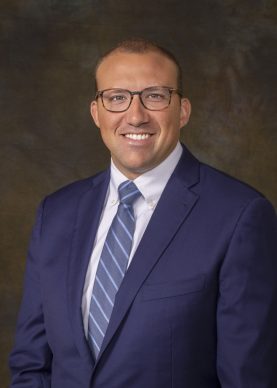Diagnosis and Treatment of Cervical Herniated Discs in Wake County

What is a Cervical Herniated Disc?
Herniated discs occur when the gel-like center of the spinal disc ruptures, causing pain and discomfort throughout the neck and back. While herniated discs are not life-threatening, they can cause debilitating pain and decrease quality of life. A cervical herniated disc that goes untreated may result in future nerve problems and compress the spinal cord.

What Causes a Cervical Herniated Disc?
There are no specific causes of a cervical herniated disc. Injury or wear and tear from improper lifting can lead to a cervical herniated disc, or it can happen spontaneously. Regardless of the cause, proper treatment and orthopedic care are essential for keeping your spine and nerves healthy.
Cervical Herniated Disc Risk Factors
Common risk factors for developing a cervical herniated disc include lack of exercise, poor posture, incorrect lifting that can cause stress on the cervical spine, and injury. Car accident injuries that cause the head to suddenly move forward and backward (whiplash) can also result in a cervical herniated disc.
Aging makes a cervical herniated disc more likely, since, as you age, the walls of your spinal discs become brittle and dry, causing them to weaken. Other factors that can make a herniated disc in the cervical spine more likely include genetics, smoking, and certain work or recreational activities, like weightlifting.
Symptoms of a Cervical Herniated Disc
Herniated disc symptoms can vary depending on the location of your pain and your pain tolerance. A cervical herniated disc can cause pain in areas other than the neck and upper back, including:
- Down your arm
- Hand
- Shoulder blade area
- Neck, when bending or turning
Other symptoms of a cervical herniated disc are:
- Muscle spasms and weakness
- Numbness
- Tingling in the arm
Numbness and tingling in the arms can also result from other ailments. Ensure that a physician properly diagnoses the disc before attempting treatment.
How is a Cervical Herniated Disc Diagnosed?
A primary care provider can usually diagnose a cervical herniated disc after reviewing your medical history and symptoms and performing a physical examination. The physician may order imaging tests, such as an MRI, CT scan, myelogram, or electromyography (EMG), and refer patients with a herniated disc to an orthopedic expert for specialized care.

Treatment for a Cervical Herniated Disc in Wake County
Nonsurgical treatment for a cervical herniated disc includes rest, medication/injections, physical therapy, and home exercises. Massage or hydrotherapy for pain relief may also be recommended. Medications to relieve cervical herniated disc pain may include naproxen or ibuprofen, analgesics, and muscle relaxants. Oral or injected steroids reduce the swelling and inflammation of a cervical herniated disc, and, combined with physical therapy, can provide relief for weeks or even years.
If nonsurgical treatments do not provide relief, a physician may recommend surgery. Surgeons remove the herniated area in most procedures.
Surgical solutions for cervical herniated discs include spinal fusion, bone grafts, metal plates, and screws to stabilize the spine and relieve pain. However, this procedure can reduce flexibility and range of motion. Other surgeries for a cervical herniated disc include microendoscopic discectomy, anterior cervical discectomy fusion, posterior cervical discectomy, and disc replacement. Your physician at Raleigh Orthopaedic will walk you through your options and provide insights on the procedure that is best suited for you.

Cervical Herniated Disc Recovery Time
Most patients with pain due to a cervical herniated disc show improvement within about six weeks and return to normal activity soon after nonsurgical treatment. Regular movement is essential to recovery and often helps speed up the healing process. Gentle exercises like shoulder stretches, neck extensions, and chin tucks can help the cervical area recover from a herniated disc. Patients recovering from a herniated disc may have the help of a physical therapist when creating an activity plan to prevent overexertion.
How Can I Prevent a Cervical Herniated Disc?
Some cervical herniated discs are inevitable, but you can reduce your risk by incorporating several healthy habits into your daily routine. Sometimes, cervical herniated discs happen unexpectedly – but you can lessen their severity and likelihood by improving your daily routine and ensuring that you perform exercises involving weights correctly.
- Practice good posture
- Stop smoking
- Avoid drinking alcohol since it can interfere with the absorption of micronutrients
- Exercise regularly
- Enjoy a diet rich in calcium, iron, magnesium, phosphorus, and vitamin D to support bone health

Expert Neck and Back Care at Raleigh Orthopaedic
Raleigh Orthopaedic provides comprehensive neck and back care for pain relief, helping our patients maintain an active lifestyle. Contact Raleigh Orthopaedic today to schedule an appointment at one of our clinic locations in Wake County, NC.

